Disclaimer: This article was initially drafted using SE Ranking’s AI Writer. However, some parts of the text were written from scratch and the content has undergone thorough revisions, editing, and fact-checking by human editors and subject matter experts to ensure accuracy.
The secret to effective search engine optimization and boosting your online visibility lies in establishing a strong base with the right keywords. But you need a jumping-off point for collecting them—you need seed keywords.
You’ve probably already used them without even realizing it. Every time you start keyword research with some broad term like laptop or search for vacation ideas, you’re working from initial seed keywords.
In this guide, we will explain what these terms are and how to find them.
Key Takeaways
- Seed keywords describe a topic generally and serve as the starting point for further keyword research.
- These terms help identify relevant long-tail keywords that your target audience is searching for, allowing you to create topically focused content.
- Establishing seed keywords is crucial for building topic clusters and improving your website’s topical authority, which can boost search engine rankings.
- Methods for finding seed keywords include brainstorming, using keyword research tools, analyzing competitor keywords, monitoring search engine suggestions, and leveraging customer feedback/reviews.
- Organize your seed keywords into a prioritized list and incorporate them into various aspects of your content strategy and marketing efforts.
What Are Seed Keywords?
Seed keywords are short-tail keywords that describe a topic broadly and serve as a foundation for identifying more specific long-tail keywords. In essence, seed keywords are words or phrases that convey main topics or ideas that will guide your content strategy.
To understand the idea better, here are some seed keyword examples.
Imagine you run a website about fitness. Your primary seed keyword could be exercise. This query is general and encompasses various topics related to exercise, such as cardio, strength training, and flexibility.
You can go further and expand this seed keyword to other terms related to exercise. For example, cardio workout, strength training exercises, or flexibility routines.
While seed keywords may have high search volumes, they are usually too general to be practical targets on their own because of high competition and blurred intent. So, you can run keyword research around the seed terms mentioned above and find more specific and less competitive long-tail keywords like HIIT cardio workout, dumbbell exercises for strength training, or yoga poses for flexibility.
Why Are Seed Keywords Important?
Seed keywords play a vital role in your keyword strategy for several reasons.
First, they provide a starting point for your keyword research. By identifying the main topics or ideas within your niche, you can get a sense of the relevant keywords to target.
Second, they help you find related longer, more descriptive keyword phrases (long-tail keywords) that your audience is searching for. They are more specific and have lower search volumes.
Let’s go back to our fitness website example. The seed term cardio workout has a monthly search volume of 27.1K per month but its difficulty score is 76, meaning it won’t be easy for you to rank for it. At the same time, the HIIT cardio workout term has a lower search volume of 4.4K and a lower difficulty score of 55, which means that ranking for this keyword is feasible for a reputed website. Also, by incorporating such long-tail keywords into your content strategy, you can attract a more focused audience that is more likely to convert.
Third, they are crucial for building topic clusters and, thus, improving your topical authority. Since Google values EEAT signals like never before, you need to show you’re an expert on a specific topic. One way of showing it is through covering every aspect of your target topic. You need to create high-quality, interlinked content pieces centered around a core subject or seed keyword.
When search engines like Google see that your website covers a broad range of topics, all connected back to a central seed keyword, they recognize your website as a more reputable source of information for that central topic. This recognition can significantly improve your chances of appearing for relevant search queries, driving valuable organic traffic to your website and ensuring SEO success.
Seed Keywords Research Process
Now that we understand the importance of seed keywords, let’s explore different methods for finding them. By using a combination of brainstorming, SEO tools, competitor analysis, SERP monitoring, and leveraging customer feedback and reviews, you can build a comprehensive list of seed keywords that will guide your content strategy.
Brainstorming Seed Keyword Ideas
One of the simplest and most effective ways to find seed keywords is through brainstorming. It allows you to tap into your existing knowledge, experience, and insights about your business, industry, and target audience.
Gather a team or individuals who have a deep understanding of your business, products, services, and target market. This could include marketing professionals, subject matter experts, sales representatives, or even engaged customers. Having a diverse group can provide different perspectives and ensure that you capture a broad range of relevant keywords.
Define the scope or focus area for which you need seed keywords. For example, if you’re a fitness apparel brand, you might focus on specific product categories like running gear, yoga apparel, or gym accessories.
Encourage participants to think freely and suggest any words and phrases that come to mind related to the defined focus area. These could be product names, features, or even popular industry jargon. For the fitness apparel brand, some seed keyword ideas might include moisture-wicking fabrics, compression leggings, sports bras, or athleisure wear.
The goal here is to share ideas and perspectives to generate as many seed keywords as possible. By collaborating and bouncing ideas off each other, you can uncover seed keywords that you may not have thought of on your own.
You can then review the collected ideas and look for patterns, common themes, or recurring concepts. Group similar terms into keyword clusters and refine them into more specific keyword phrases.
Using Keyword Research Tools
In addition to brainstorming, keyword research tools are essential for finding seed keywords.
Tools like SE Ranking provide valuable insights into popular search terms related to your industry and display essential SEO metrics and keyword data like search volume, search intent, keyword difficulty, competition level, etc. This information allows you to prioritize seed keywords based on their potential to drive organic traffic to your website.
To find seed keywords with SE Ranking, go to the Keyword Research tool and enter your keyword. Let’s see how it works using the hiking backpack query.
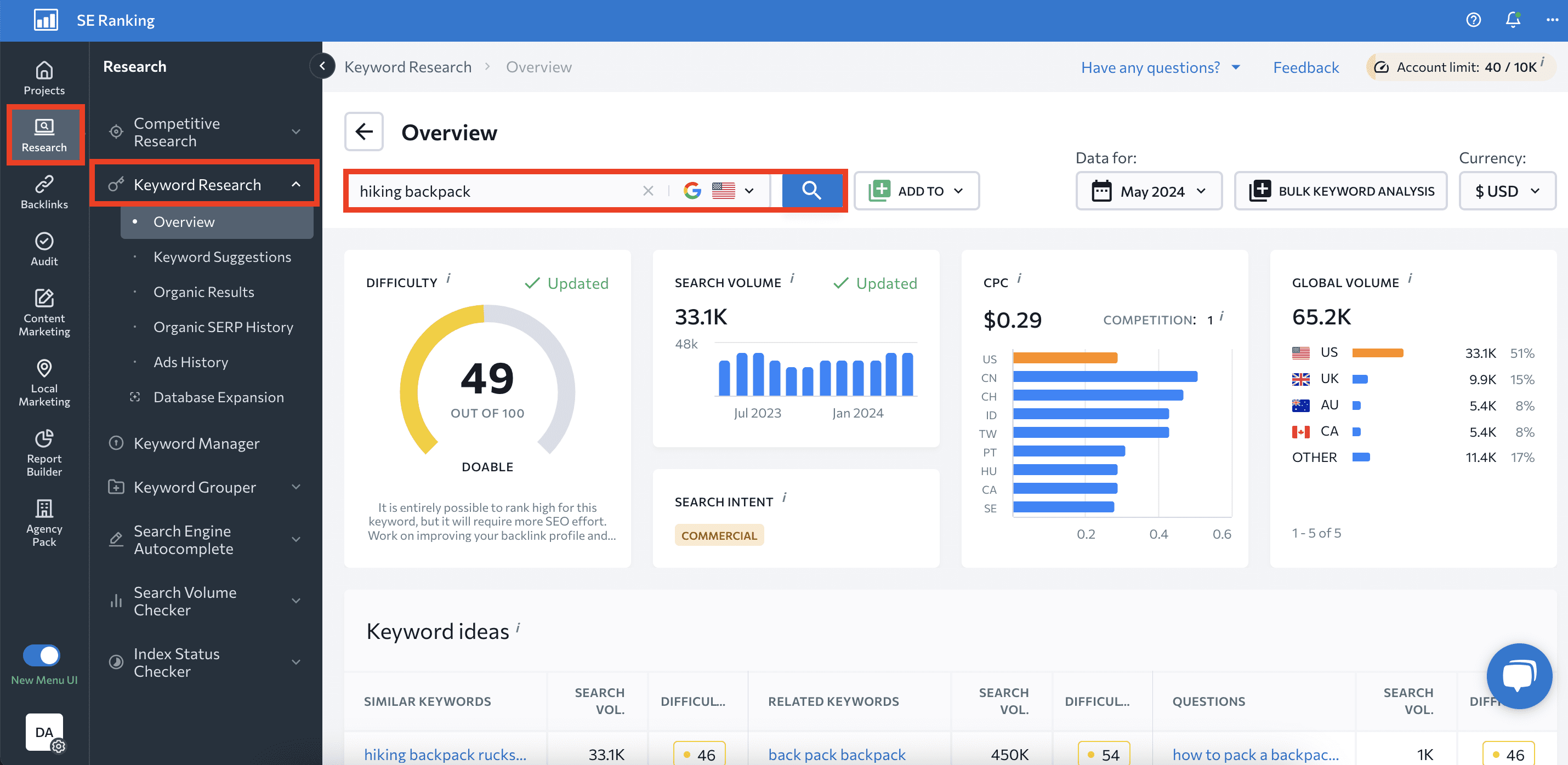
Once there, open the Keyword Suggestions section to see the list of different keyword ideas.

Since seed keywords usually comprise on 1-2 words you can filter out such short-tail terms via filters. You can also specify the relevant ranges for search volume, keyword difficulty, search intent, and other parameters.

As you can see we now can expand our list of seed keywords with terms like frame backpack, outdoors backpack, and light backpack and incorporate them in the content or use them for the long-tail keyword research.
Another option to find seed keywords is to use Google tool for collecting keywords—Google Keyword Planner Tool.
This instrument generates a list of related keywords that can be used to optimize website content and improve search engine rankings. It provides data on search volume and competition levels of these keywords, but it doesn’t have many filtering options. You won’t be able to single our short-tail keywords. In addition, this keyword tool is designed to research keywords for Google Ads and may not cover all the SEO needs.
Analyzing Competitor Keywords
Studying your competitors’ websites and their content is another excellent method for finding seed keywords. By identifying the keywords they are targeting, you can gain insight into potential keywords that you may have overlooked.
First, you need to identify your main competitors. For more details on how to do it, read our guide on finding rivals of any website.
Once you have a list of your top competitors, you’ll need to analyze their websites, including content, titles, meta descriptions, headings, and other on-page elements.
You can do this using SE Ranking’s Competitive Research Tool. Just enter your competitor’s website address and launch the analysis.
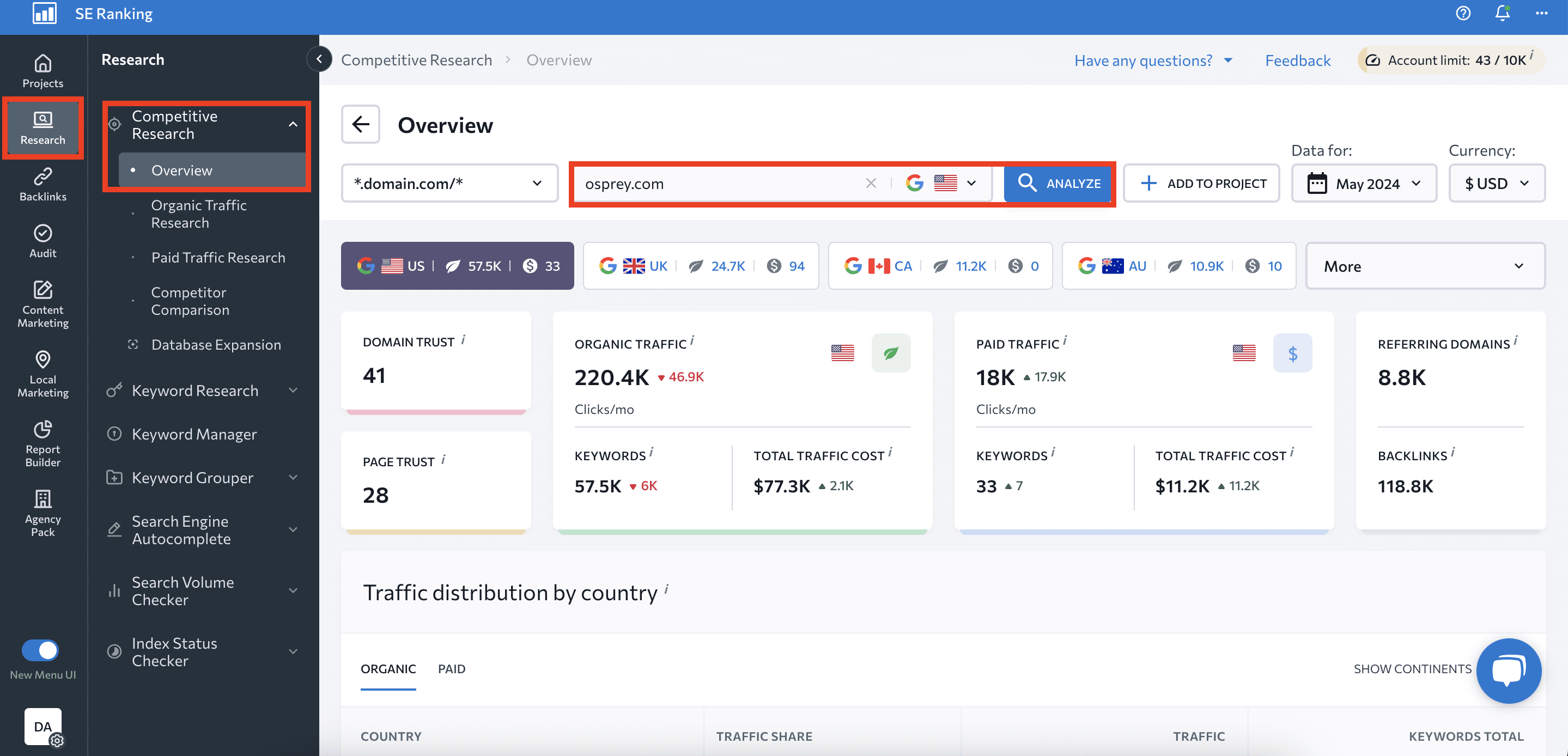
Once there, go to the Keywords tab in the Organic Traffic Research report. Right below the graph, you’ll see the list of keywords this website is targeting with essential keyword data.
You can apply the same filters as in the Keywords Research Tool and find a few more relevant seed keywords. For instance, tweens backpacks, wheel backpacks, raincover backpacks, and hikers backpacks.

You should also check the names of the categories your competitors use.
The screenshot below reveals several more relevant seed keywords used as categories on the website selling backpacks: outdoor packs, mountain biking packs, trail running packs, climbing & mountaineering packs, and skiing and snowboarding packs.
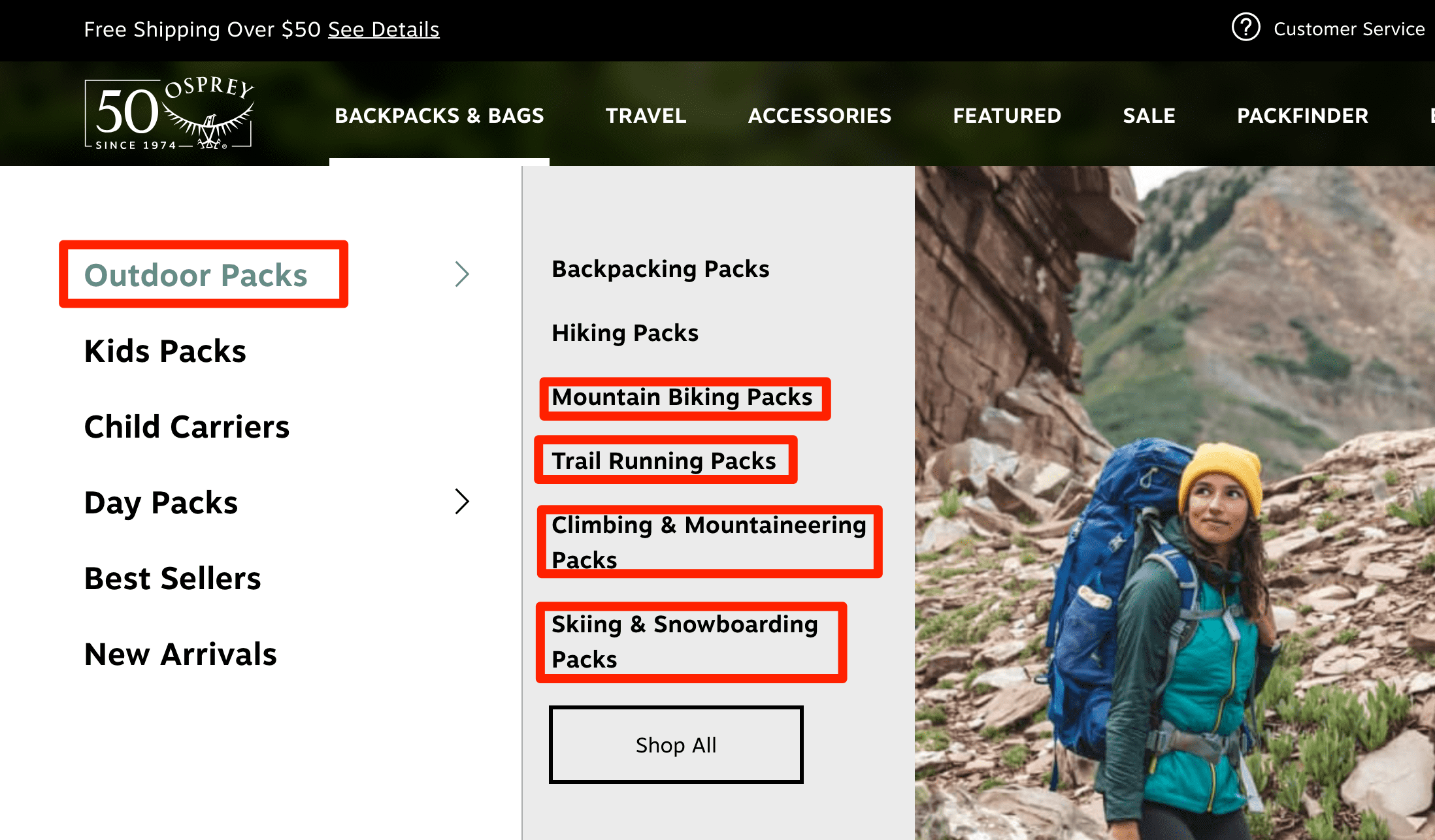
Checking the SERP
Search engines like Google offer valuable insights into what users are searching for through their autocomplete suggestions, “People Also Ask” boxes and related search recommendations. These features help discover seed keywords that align with your target audience’s interests and search behaviors.
Start by entering a broad keyword or phrase related to your business, industry, or topic into the search bar.
As you type, the search engine will provide a list of popular autocomplete suggestions based on real user queries. These suggestions can reveal potential seed keywords that you may not have considered initially.
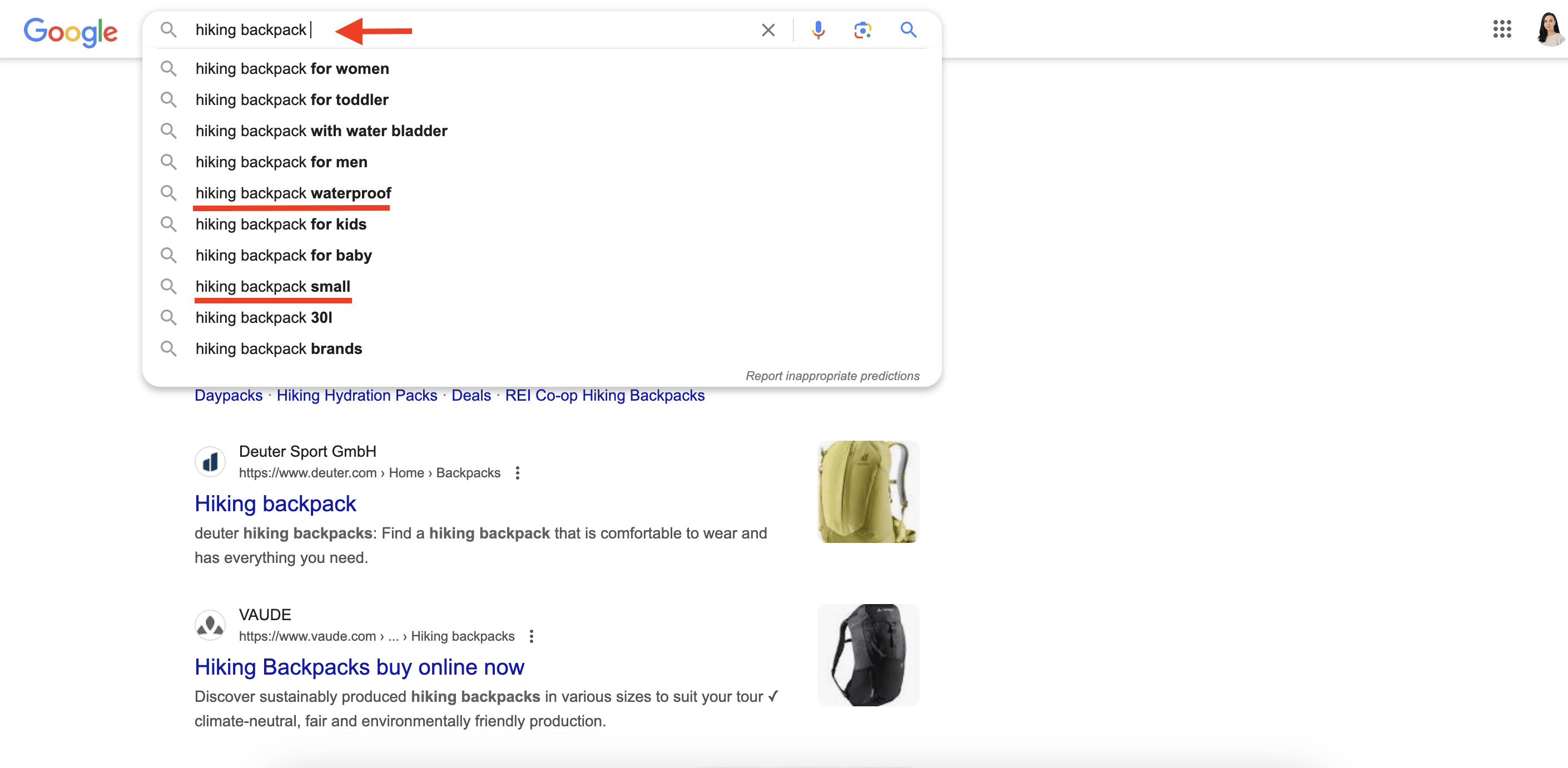
Pay attention to the “People Also Ask” box and the “People also search for” section They display questions and phrases related to an original query.
Leveraging Customer Feedback and Reviews
Your customers are an invaluable resource when it comes to finding seed keywords. Listen to their needs and pay attention to their feedback and reviews on your website, social media mentions and comments, customer support inquiries, or third-party review platforms. Analyze the language they use to describe your product or service and identify keywords that resonate with them.
If you run a local business, you likely get your company listed on third-party review platforms and encourage your clients to share their feedback. In this case, you can use SE Ranking’s Local Marketing Tool to analyze those reviews and identify patterns in the keywords your clients use when providing feedback.
This tool has a separate section for this—Reviews. Go to the Insights tab to see the list of keywords extracted from the reviews you’ve received. Apply filters to choose a specific language, frequency of appearance in reviews, and word count.
If you click on a specific keyword, you’ll see the review it was used in to analyze the context.
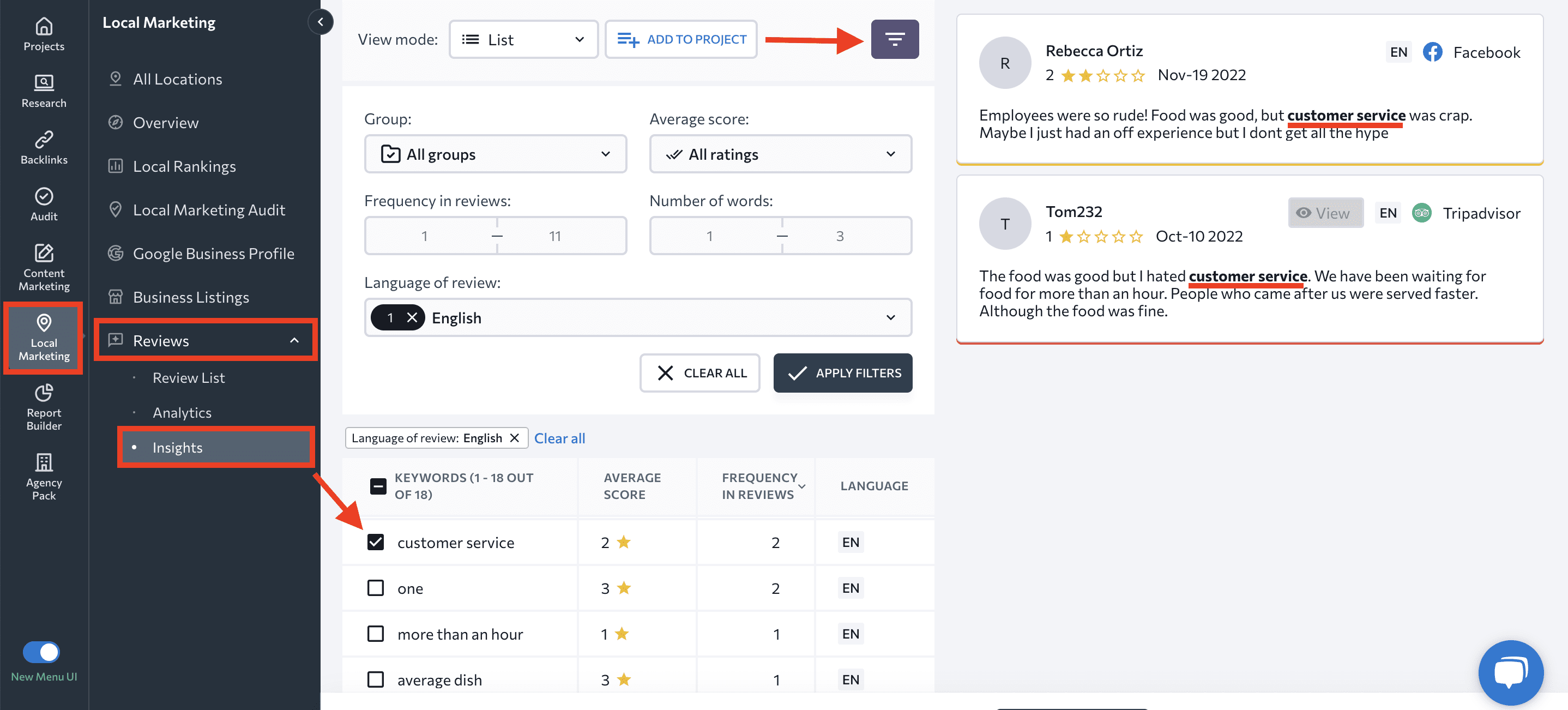
Use Google Search Console
Google Search Console is a free tool by Google to track your website’s visibility in search. It can also serve as an instrument for finding seed keywords based on your website’s current performance.
Go to the Performance section and then to Search Results. You can find a list of keywords your content already ranks for in the Queries tab. Although it doesn’t have any seed keyword or word count filters, you can sort the list of terms by impressions in descending order. This will help you identify potential seed terms that you’re ranking for now.
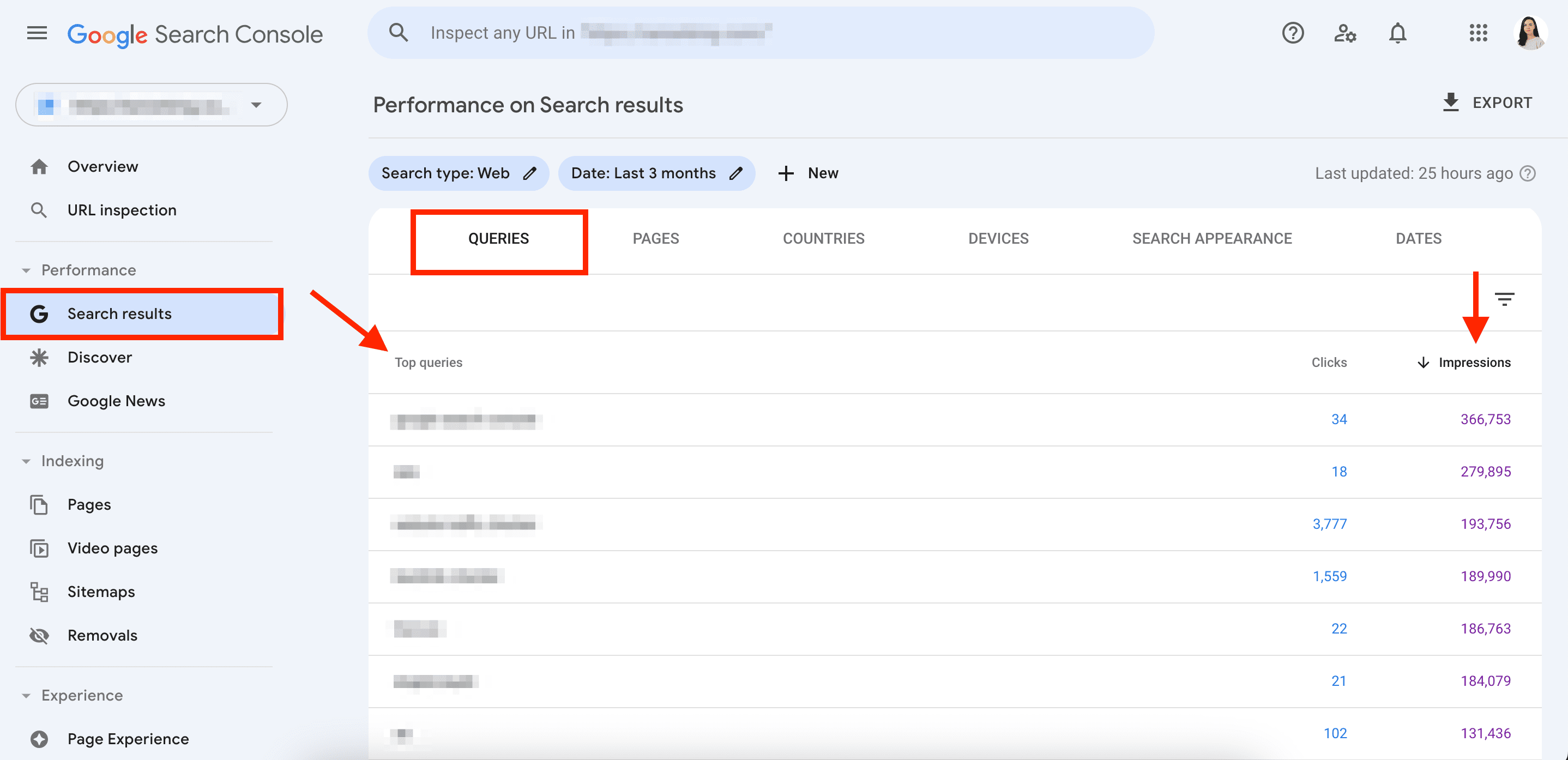
What’s Next: Creating a Seed Keyword List
Now that you have explored various methods for finding seed keywords, it’s time to compile them into a comprehensive list:
- Organize your seed keywords into relevant categories or themes to ensure easy reference and organization.
- Prioritize keywords based on their relevance and search volume.
- Focus on keywords that have the potential to drive significant organic traffic to your website. By prioritizing these keywords, you can ensure your content strategy aligns with your audience’s needs and interests.
Your seed keyword list will serve as the foundation for your SEO strategy. Refer to it regularly to find new keyword opportunities and when creating new content to ensure that you are targeting the right keywords. You can also:
- Incorporate them into blog posts to build semantic relevance
- Use them as category names on your website
- Include them in social media posts to attract more engagement
- Use them in hashtags to increase visibility on platforms like Instagram or Twitter
- Include them in email subject lines to increase open rates
- Use them in online advertising campaigns to target specific audiences
- Incorporate them into YouTube video titles and descriptions to improve search rankings
Conclusion
Building a solid keyword strategy starts with identifying the right seed keywords. By tapping into your own knowledge, industry expertise, competitor analysis, search data, and customer insights, you can uncover the core topics and phrases that resonate with your target audience.
These seed keywords then become the foundation for finding more specific long-tail keywords, building topical authority, and creating content that attracts valuable organic traffic.
Don’t let the process of finding seed keywords overwhelm you. Approach it with patience, diligence, and an open mind to uncover those golden keyword opportunities.
- SEO Powered Content & PR Distribution. Get Amplified Today.
- PlatoData.Network Vertical Generative Ai. Empower Yourself. Access Here.
- PlatoAiStream. Web3 Intelligence. Knowledge Amplified. Access Here.
- PlatoESG. Carbon, CleanTech, Energy, Environment, Solar, Waste Management. Access Here.
- PlatoHealth. Biotech and Clinical Trials Intelligence. Access Here.
- Source: https://seranking.com/blog/seed-keywords/




